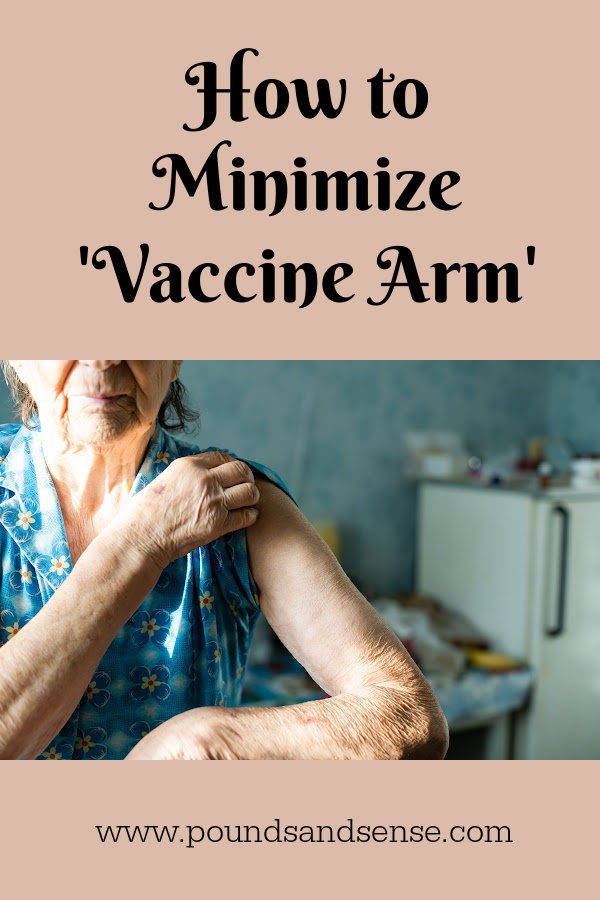How to Minimize ‘Vaccine Arm’
This year I have had five vaccines in total. Three of them were for Covid-19, including my booster jab earlier this month. The other two were a flu jab and a pneumonia jab ( the latter is offered by the NHS to everyone reaching the age of 65 in Britain).
You will gather from the above that I am not an anti-vaxxer (though as my Twitter followers will know, I do have reservations about the effectiveness of lockdowns, vaccine passports and mask mandates in combatting the spread of Covid-19).
But while I accept the need for vaccines for older people especially, I know some do get side-effects from them. The most common is an aching arm. This can be very painful and make activities such as driving difficult, though thankfully for most it usually lasts no more than a day or two.
My personal experience with vaccines this year is that I got the worst side-effects from the flu jab, including waking up in the night shivering and feeling sick. With my two Oxford-AstraZeneca jabs I had almost no side-effects, and the same applies to the pneumonia vaccine. With my booster jab, however – which was Pfizer – my arm started aching quite badly and I got a stiff shoulder as well.
In my vaccine journey this year I have found a couple of things that have really helped me minimize side-effects, so I thought I would share them today.
1. Prophylactic Paracetamol
Taking paracetamol is widely recommended if you get an aching arm and/or other side effects from the vaccines. I now take a couple at bedtime on the day I have had the jab, even if at that point I have no side-effects. I continue this the next day, taking them at four-hourly intervals (you shouldn’t take them any more frequently than that) until I am confident that I won’t be getting any side-effects or they have largely subsided.
- One thing you shouldn’t do is take paracetamol before having the jab as it is possible this may reduce its efficacy. Not much research appears to have been done about this, but to be on the safe side it’s best avoided.
2. Gentle Arm Exercises
I tried this with my recent Pfizer jab, and was genuinely amazed by how effective it proved in easing stiffness and pain in my arm and shoulder. Friends I have recommended this to have been impressed by how effective it proved for them as well.
The exercises I use can be found on the aptly-named Sheltering Arms website. There are five in all, with short videos to illustrate them. They are simple, easy exercises and you don’t have to do them all if you don’t want to. As I had a stiff shoulder, I also threw in some shoulder rotations (basically rotating the shoulders upwards and backwards, then down and forward again, as was recommended to me a few years ago by a physio). I found this very effective as well.
I kept doing the exercises for a few minutes throughout the day and noticed an improvement within hours. By the end of the day, my arm and shoulder were pretty much back to normal.
Obviously I am no medic, but I understand that gently exercising the vaccinated arm helps disperse the vaccine throughout your body and reduces local muscle soreness. That being the case, it would appear a good idea to start doing these exercises even before any pain or stiffness occurs, again as a prophylactic measure. At my next jab, I intend to start soon after leaving the vaccination centre!
I would also recommend that you don’t do what I have done in the past, which is spend hours hunched over a keyboard after having your jab in case you can’t do this later. That could well reduce the opportunity for the vaccine to disperse and may add to any stiffness you experience later. Get your keyboarding out of the way before you go for your jab!
I hope you find these ideas helpful and they work as well for you as they have for me. Please feel free to leave any comments or questions below as usual. I’d also be interested to hear about your own experiences with ‘vaccine arm’ and any other methods you have found helpful for addressing the problem.
- Please bear in mind that I don’t have any medical training and can’t give personalized advice, only share what has worked for me. Obviously if you get more serious side-effects from the vaccine, you should contact a medical professional as soon as possible. This NHS website page has more information.


December 3, 2021 @ 8:46 pm
This is really helpful. Like you I have had the worst reaction from the flu vaccine – however it always makes me feel a bit rough! I’m yet to have my booster but will bear these in mind for when I do!
December 4, 2021 @ 7:39 am
Many thanks, Rebecca. Yes, sadly I think we are all going to have to resign ourselves to regular jabs for the foreseeable future.
December 8, 2021 @ 11:04 am
I may need to try some arm exercises when I get my booster as I did get quite a lot of aches when I had my COVID vaccine x
December 9, 2021 @ 6:48 am
Thanks, Rhian. Yes, I highly recommend giving the arm exercises a try.